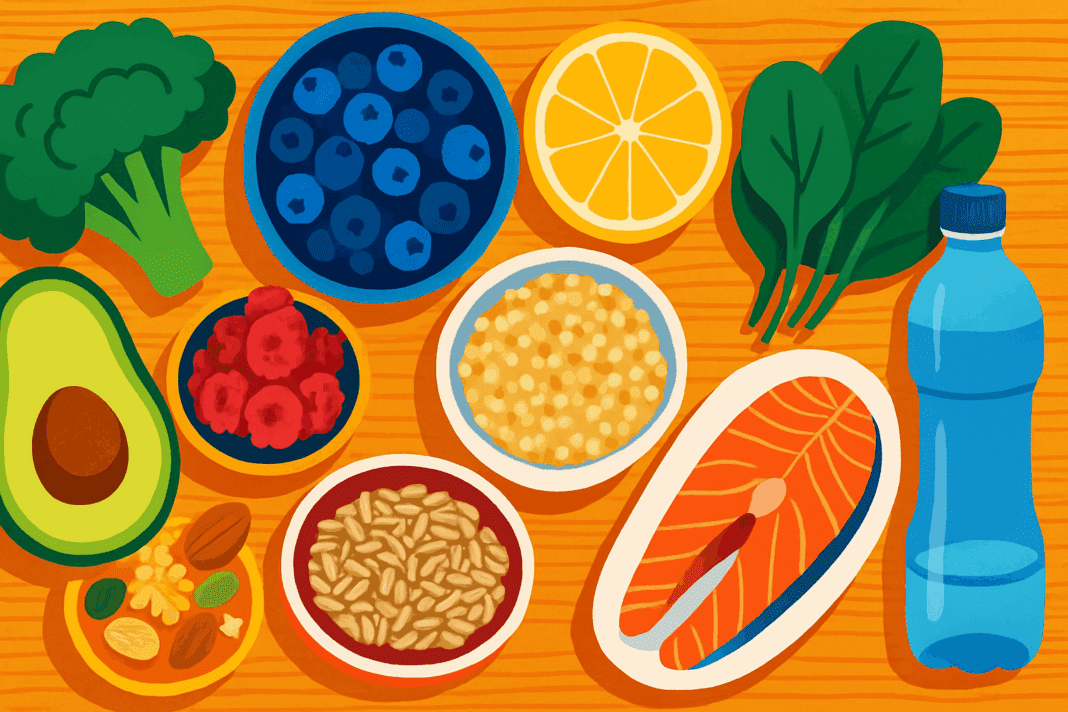Introduction: The Critical Role of Nutrition in Energy and Focus
In an age of constant cognitive and physical demands, the pursuit of optimal performance—whether at work, in the classroom, or at the gym—hinges on one vital element: nutrition. The food we consume doesn’t just sustain us; it fuels the neurons that power our decisions, the muscles that carry us through our routines, and the systems that maintain our overall vitality. What we eat has a direct and measurable impact on mental clarity, physical stamina, and the capacity to stay alert and productive throughout the day. Understanding which nutrients support brain function, metabolic energy, and sustained concentration empowers individuals to make smarter dietary choices aligned with their health and performance goals.
You may also like: Best Foods for Cognitive Function: What Science Reveals About Brain Nourishment, Focus, and Mental Clarity
Science has long established that certain foods provide a more robust foundation for cognitive endurance and physical energy than others. Nutrient-dense, whole foods not only help maintain stable glucose levels but also contribute to neurotransmitter production, cellular repair, and inflammatory balance. For anyone asking what fruits help you boost your energy, or seeking the best foods for energy and concentration, this article offers an evidence-based exploration of enriching foods that support performance from the cellular level up. By drawing from current nutritional science and integrating practical applications, we uncover how increasing food quality—not just quantity—can unlock greater focus and vitality.
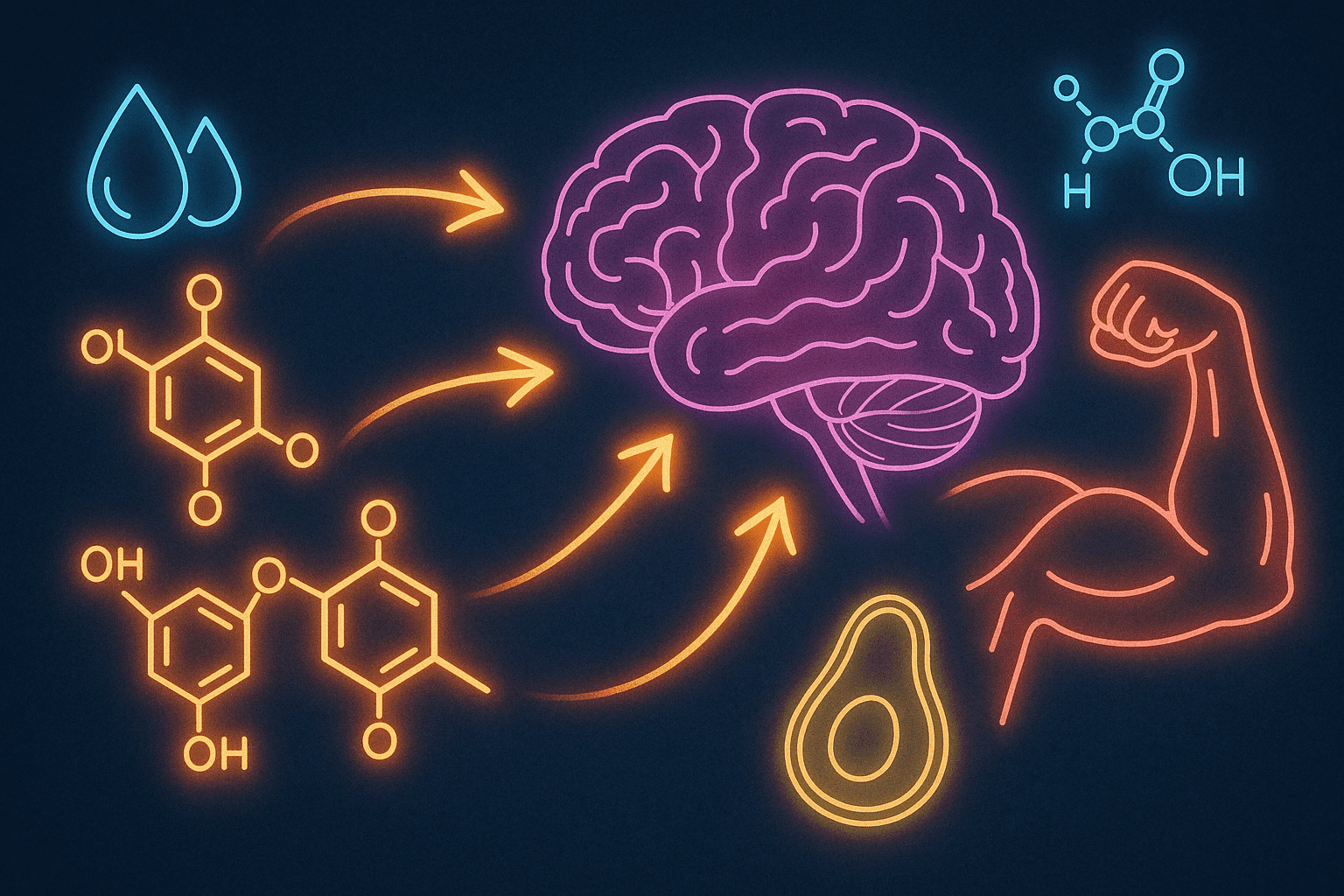
Understanding the Biochemistry of Energy and Focus
To understand how foods affect energy and concentration, it’s important to consider how the brain and body derive fuel. Glucose, derived from carbohydrates, is the primary energy source for the brain. However, not all carbohydrates function the same way. Highly processed sugars may lead to rapid spikes and subsequent crashes in blood sugar, impairing focus and inducing fatigue. In contrast, complex carbohydrates from whole grains, legumes, and certain fruits provide a slower, more sustained release of glucose, thereby enhancing both physical and mental performance.
Similarly, amino acids from protein-rich foods play an essential role in producing neurotransmitters like dopamine, serotonin, and acetylcholine—chemicals that influence mood, attention, and motivation. Omega-3 fatty acids, particularly those found in fatty fish, contribute to cell membrane fluidity and anti-inflammatory signaling, which are both essential for sharp cognitive function. Meanwhile, micronutrients such as magnesium, B vitamins, and iron facilitate critical enzymatic reactions involved in mitochondrial energy production. In this way, choosing the best foods for energy and focus means selecting items that work synergistically to support these biochemical processes.
It’s also worth noting the importance of hydration. Dehydration, even at mild levels, can lead to decreased alertness, slower cognitive processing, and lower physical endurance. Foods with high water content—such as cucumbers, citrus fruits, and leafy greens—can contribute to hydration while delivering key vitamins and minerals. Ultimately, the relationship between nutrition and performance isn’t linear but multifaceted, involving macro- and micronutrient interactions, hormone regulation, and gut-brain signaling. Recognizing these intricate dynamics can guide more effective food choices tailored to individual energy needs.
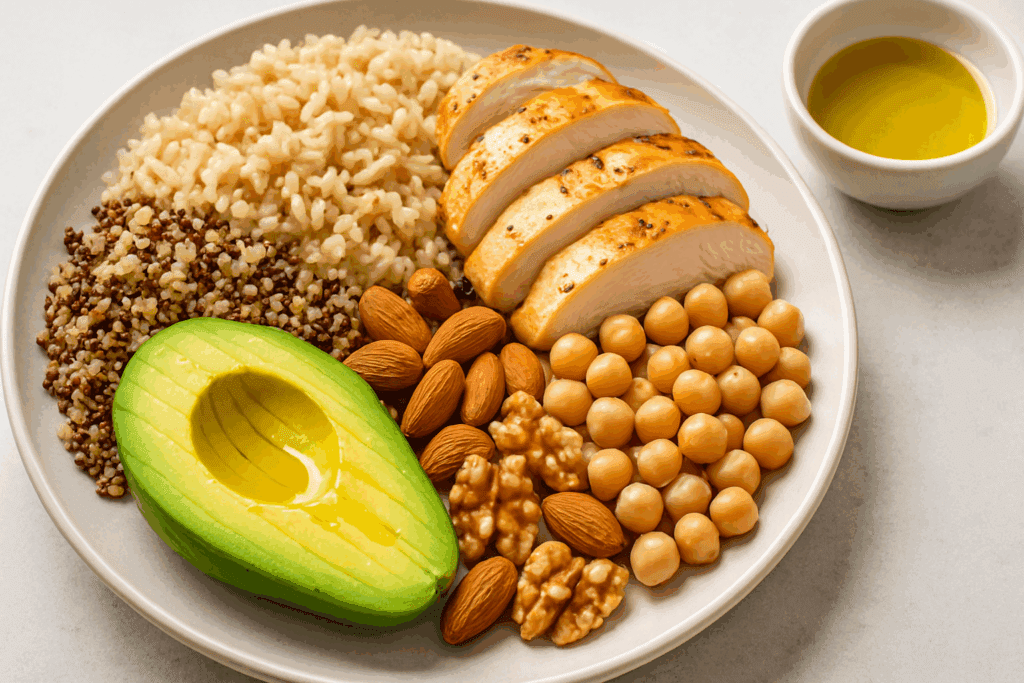
The Best Foods for Energy: Whole Grains, Lean Proteins, and Healthy Fats
Whole grains such as quinoa, oats, and brown rice are cornerstone examples of enriching foods that promote stable energy levels. Rich in complex carbohydrates and fiber, they allow for a gradual release of glucose into the bloodstream, preventing the peaks and crashes associated with refined grains. Unlike sugary cereals or white bread, which may offer a quick but unsustainable burst of energy, whole grains provide consistent fuel that can carry the body and mind through extended periods of activity or concentration.
Lean proteins like turkey, chicken breast, and legumes also serve as potent foods for energy and focus. Not only do they supply the amino acids necessary for neurotransmitter synthesis, but they also help keep you full, reducing the likelihood of energy-depleting snacking between meals. In particular, the amino acid tyrosine—found in chicken, eggs, and dairy—supports the production of dopamine, a key player in motivation and mental alertness. In this way, increasing food intake from lean protein sources can directly enhance both stamina and attention.
Equally essential are healthy fats, such as those found in avocados, nuts, seeds, and olive oil. These fats support the structure of brain cells, reduce inflammation, and help absorb fat-soluble vitamins such as A, D, E, and K. Medium-chain triglycerides (MCTs), present in coconut oil, are rapidly metabolized by the liver into energy, making them a unique and immediate fuel source. When balanced correctly, a diet that includes these best foods for energy and concentration can significantly improve both physical endurance and cognitive resilience.
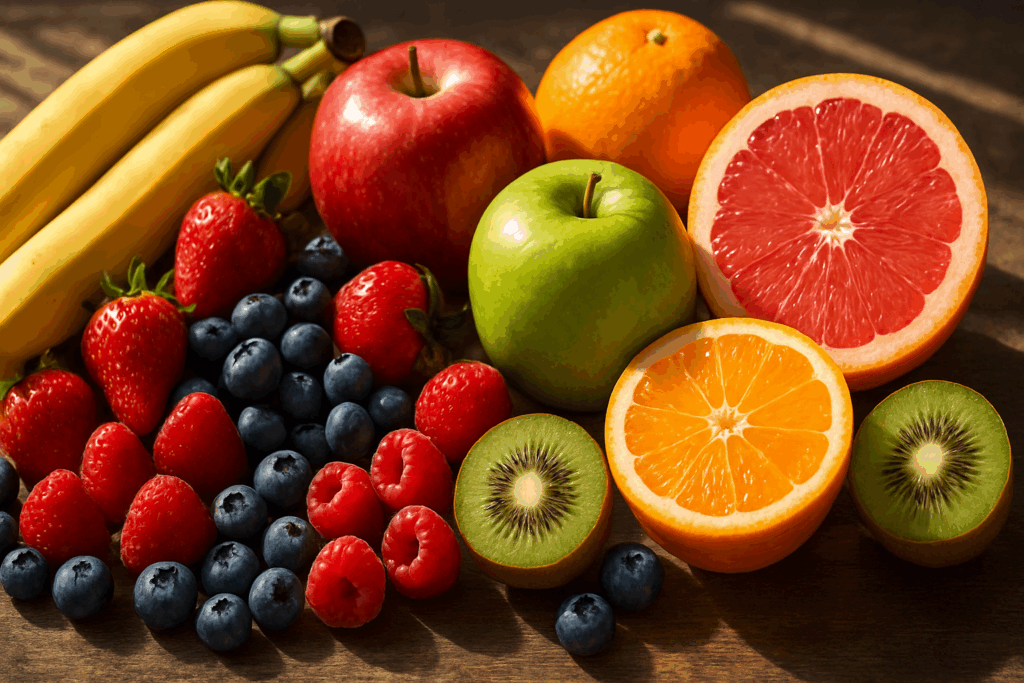
What Fruits Help You Boost Your Mental and Physical Energy?
Fruits are often underrated as sources of long-lasting energy, but they are among the most efficient providers of quick, clean fuel for both mind and body. Bananas, for example, contain natural sugars, fiber, and potassium, making them ideal pre-workout snacks. Their carbohydrate content replenishes glycogen stores, while potassium helps regulate nerve and muscle function. Studies show that bananas can be as effective as sports drinks for sustaining energy during endurance activities.
Berries—particularly blueberries, strawberries, and blackberries—are rich in antioxidants that combat oxidative stress in the brain. This is particularly relevant for cognitive function, as oxidative stress can impair memory and decision-making. These fruits also support vascular health, which improves oxygen and nutrient delivery to the brain. Including berries in the daily diet is an excellent way to boost both physical energy and mental sharpness naturally.
Citrus fruits like oranges and grapefruits, abundant in vitamin C, help reduce fatigue by lowering levels of the stress hormone cortisol. Their high water content also aids hydration, which is essential for focus. Apples, with their soluble fiber and low glycemic index, provide steady glucose release, preventing mental fog and mid-morning crashes. Understanding what fruits help you boost your energy involves more than just counting calories—it requires appreciating the nutrient density and functional effects of each fruit.
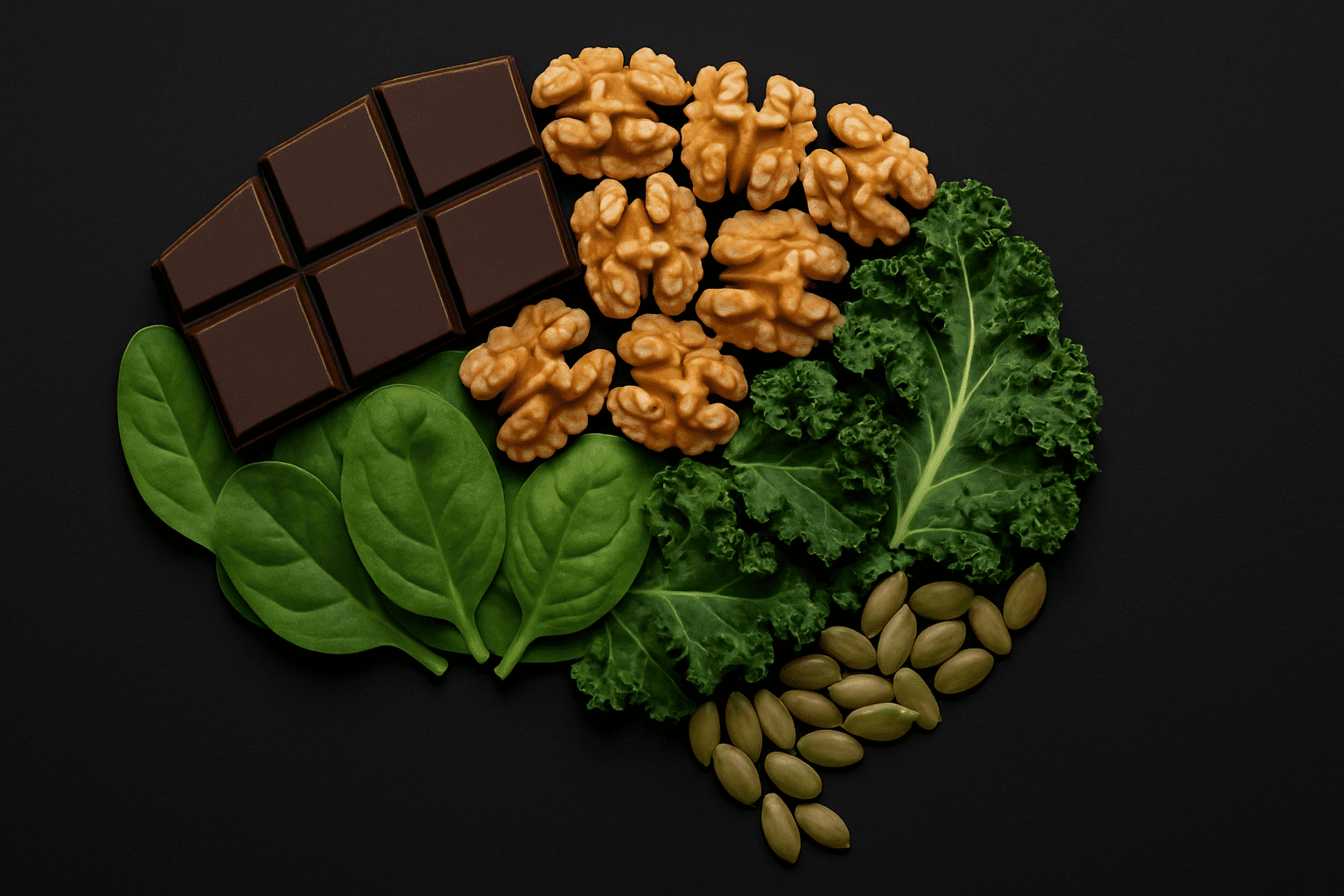
Enriching Foods That Enhance Cognitive Function and Attention
The brain is a metabolically demanding organ, consuming up to 20% of the body’s energy at rest. As such, enriching foods that support its function are vital for focus, memory, and productivity. Leafy greens like spinach, kale, and Swiss chard are rich in folate, vitamin K, and lutein—all compounds associated with slower cognitive decline and improved working memory. These vegetables also provide magnesium, which plays a key role in neural transmission and neuroplasticity.
Nuts and seeds are another category of nutrient-dense, brain-supportive foods. Walnuts, in particular, are high in alpha-linolenic acid (ALA), a plant-based omega-3 fatty acid that supports brain structure and function. Pumpkin seeds deliver zinc and magnesium, which are crucial for mood stability and cognitive control. Regularly incorporating these increasing food options into your meals can result in noticeable improvements in attention span and problem-solving abilities.
Dark chocolate, when consumed in moderation, offers a surprising number of cognitive benefits. It contains flavonoids that increase blood flow to the brain, enhancing function in areas responsible for memory and attention. Furthermore, dark chocolate stimulates the release of endorphins and serotonin, chemicals that improve mood and mental clarity. These food choices, when thoughtfully integrated into a balanced diet, become powerful tools for boosting concentration and performance.
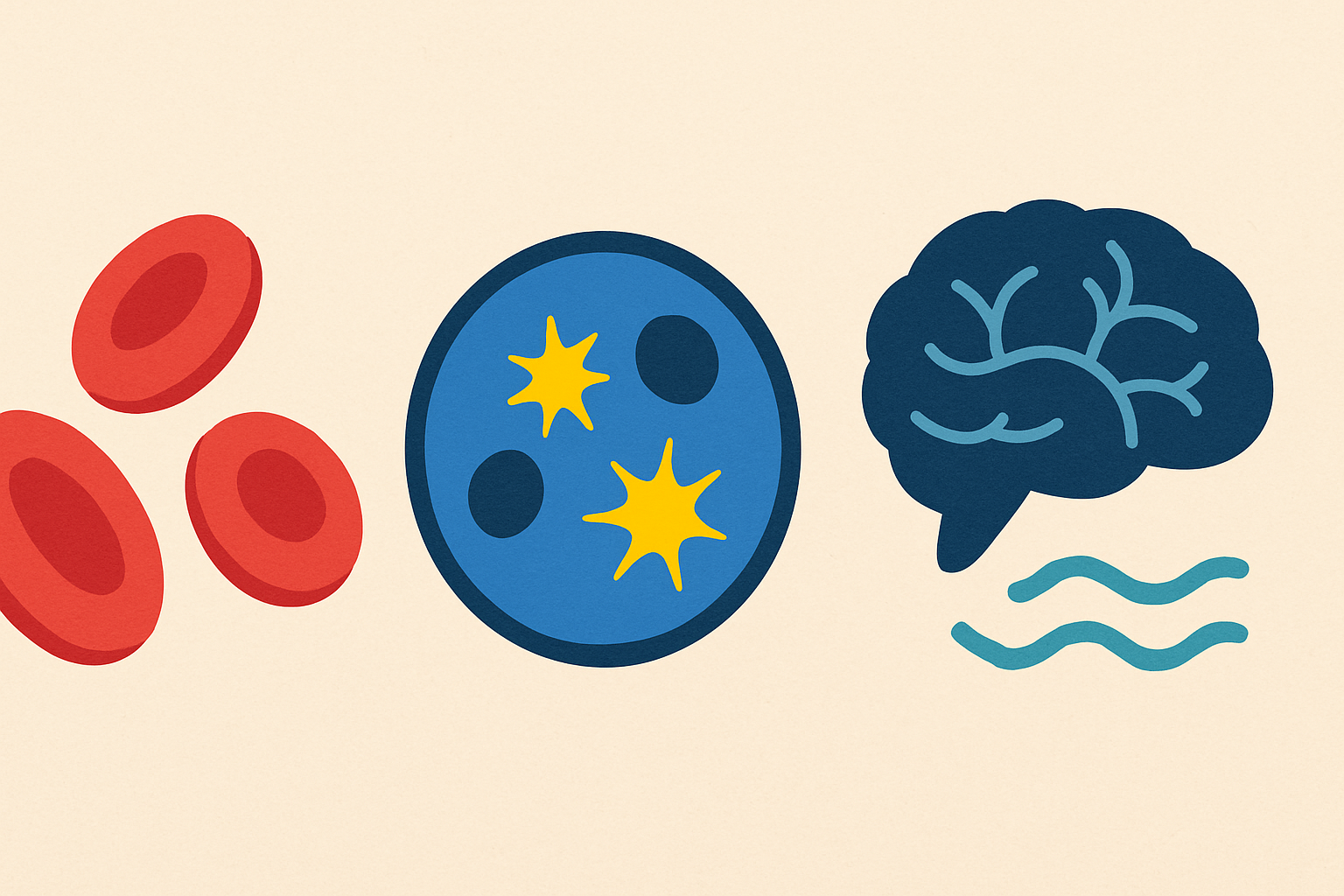
The Role of Micronutrients in Sustaining Energy and Focus
While macronutrients often take center stage in discussions about energy, micronutrients are equally crucial. B vitamins—especially B6, B9 (folate), and B12—are involved in the synthesis of neurotransmitters and energy production at the cellular level. A deficiency in these vitamins can result in fatigue, poor concentration, and mood disturbances. Whole grains, eggs, and fortified cereals are effective sources of B vitamins that support both physical energy and mental acuity.
Iron is another critical mineral that influences energy and focus. It plays a central role in oxygen transport, and low iron levels can lead to anemia, which often manifests as chronic fatigue and reduced cognitive performance. Red meat, lentils, and dark leafy greens offer bioavailable sources of iron, and pairing them with vitamin C-rich foods enhances absorption. Ensuring adequate iron intake is especially important for menstruating women, athletes, and those following plant-based diets.
Magnesium, often overlooked, affects more than 300 biochemical reactions in the body, many of which are directly tied to muscle function, nerve transmission, and energy metabolism. Foods such as almonds, cashews, and dark chocolate offer magnesium in a highly absorbable form. By including these best foods for energy and concentration in your regular diet, you’re not only supporting your body’s basic needs but enhancing your ability to perform at a higher level, both mentally and physically.
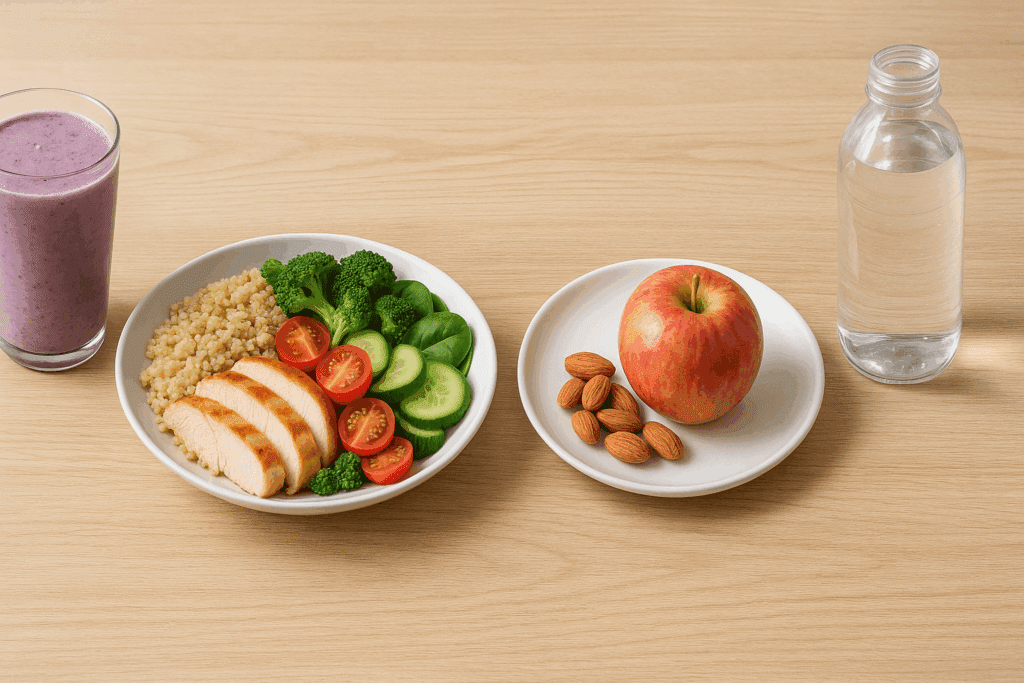
Timing, Balance, and Meal Composition for Optimal Energy
The timing of meals and the composition of each plate significantly affect energy availability and mental focus. Skipping meals or consuming high-sugar foods on an empty stomach can lead to erratic blood sugar levels, triggering fatigue, irritability, and impaired decision-making. By contrast, balanced meals that combine protein, complex carbohydrates, and healthy fats promote a steady release of glucose, minimizing energy dips throughout the day.
For breakfast, combining oatmeal with berries and a spoonful of almond butter provides a synergistic blend of macronutrients that supports sustained energy and sharpness. Midday meals might feature grilled chicken over quinoa and leafy greens, incorporating the best foods for energy and focus in one nutrient-rich bowl. Snacks like Greek yogurt with walnuts or a boiled egg with whole-grain toast offer convenient options to bridge energy gaps without relying on processed foods.
Meal timing can also be optimized around your daily rhythms. For many, cognitive function peaks mid-morning, so consuming nutrient-dense foods early in the day can amplify productivity. Hydration should accompany each meal to support digestion and nutrient delivery. Ultimately, consistency in meal composition and timing creates a metabolic environment conducive to sustained physical vitality and focused mental performance.
Frequently Asked Questions (FAQ)
- What are some of the best foods for energy and concentration?
Foods that increase your energy and concentration include a variety of nutrient-rich options, such as leafy greens, nuts, seeds, and whole grains. These enriching foods provide a steady release of energy, keeping you alert throughout the day. Omega-3-rich foods like salmon and chia seeds are excellent for boosting both brain function and overall vitality. Incorporating foods like avocados, which are high in healthy fats, helps maintain focus, while complex carbs from oatmeal or quinoa can keep your energy levels stable. The best foods for energy and concentration combine vitamins, minerals, and healthy fats to fuel the brain and body effectively. - Which fruits help you boost your energy naturally?
When looking for fruits that help you boost your energy, consider bananas, oranges, and apples. These fruits are rich in essential sugars and fiber, which provide quick energy without causing a spike in blood sugar. For a more sustained energy boost, try berries like blueberries, which contain antioxidants that support brain function and mental clarity. Fruits like kiwi and watermelon also offer hydration and electrolytes, vital for maintaining energy levels throughout the day. The best foods for energy include these vibrant fruits, which deliver essential nutrients that keep both your mind and body feeling revitalized. - How can I use foods to enhance both energy and focus during the workday?
Incorporating foods that increase your mental clarity can significantly enhance your work performance. Foods rich in protein, such as eggs, turkey, and Greek yogurt, help balance blood sugar levels, providing sustained energy and focus. In addition, incorporating complex carbs from whole grains or sweet potatoes can keep you feeling energized without the energy crashes associated with processed sugars. Drinking green tea can also serve as a natural energy booster, enhancing concentration. These enriching foods, when combined in a balanced diet, support both cognitive function and physical endurance. - What are the best foods for energy during intense physical activity?
During periods of intense physical activity, it’s essential to fuel your body with foods that increase endurance and strength. The best foods for energy in this context include complex carbohydrates like brown rice, whole-grain pasta, and quinoa, which provide long-lasting fuel. Lean proteins, such as chicken or tofu, support muscle repair and recovery, while healthy fats from nuts and seeds offer additional energy. Foods rich in potassium, like sweet potatoes and avocados, help prevent muscle cramps and sustain energy levels during prolonged workouts. These energizing foods work synergistically to keep you performing at your best. - What are some examples of enriching foods that help with mental clarity?
To boost mental clarity and stay focused throughout the day, choose enriching foods like spinach, kale, and other leafy greens. These vegetables are high in folate, which supports brain function. Omega-3-rich foods such as flaxseeds, walnuts, and fatty fish like salmon can also help improve brain health. Additionally, eating foods rich in magnesium, such as dark chocolate and almonds, can help reduce stress, further enhancing mental clarity. By incorporating a variety of these foods that increase brain function, you’ll support both your cognitive performance and overall well-being. - How do I incorporate foods for energy and focus into my daily routine?
Incorporating foods for energy and focus into your routine involves making strategic meal choices throughout the day. For breakfast, opt for whole grains like oatmeal or a smoothie with chia seeds, spinach, and berries, which will provide sustained energy. Lunch might include lean protein, quinoa, and avocado for long-lasting focus. For an afternoon snack, a handful of nuts or a banana can help keep your energy levels steady. By integrating these best foods for energy into your meals, you can maintain focus and productivity all day long. - What are some foods that help improve both physical and mental energy?
Foods that increase both physical and mental energy include a balance of proteins, healthy fats, and fiber. Avocados, rich in healthy fats, help fuel both the brain and body. Quinoa, a complete protein, provides long-lasting energy for physical activities while supporting cognitive function. Oats and whole grains keep your blood sugar levels steady, providing sustained energy. Combining these energizing foods in a balanced diet ensures that both your body and mind are properly fueled for any challenge. - Are there any foods that increase energy and concentration without caffeine?
Yes, there are plenty of foods that increase energy and concentration without relying on caffeine. Omega-3-rich foods like flaxseeds and salmon, combined with complex carbs like quinoa or brown rice, offer steady energy and improved focus. Nuts and seeds, such as almonds and sunflower seeds, provide a good source of protein and healthy fats, which are essential for brain health. Dark leafy greens like kale and spinach support cognitive function with their high levels of antioxidants and folate. These foods provide a natural energy boost without the need for caffeine, helping you stay alert and focused throughout the day. - What are some practical tips for using food for energy and focus throughout the day?
To use food for energy and focus, aim to eat smaller, balanced meals every few hours. Start your day with a breakfast that includes protein, healthy fats, and complex carbohydrates, such as eggs with whole-grain toast and avocado. Midday meals should also focus on lean protein and fiber-rich foods, like a chicken salad with quinoa and leafy greens. Snacks such as Greek yogurt with berries or a handful of mixed nuts can provide the energy boost needed between meals. By incorporating these foods that increase energy and focus, you can maintain high levels of concentration and productivity throughout your day. - How do nutrient-dense foods help increase focus and productivity?
Nutrient-dense foods, which are high in essential vitamins, minerals, and antioxidants, play a critical role in boosting focus and productivity. Foods like spinach and kale are rich in folate, which helps improve memory and cognitive function. Incorporating foods like salmon, which is rich in omega-3 fatty acids, supports brain health and reduces mental fatigue. Similarly, complex carbohydrates from whole grains help maintain steady blood sugar levels, preventing energy crashes. By regularly consuming these enriching foods, you can provide your brain with the nutrients it needs to stay focused, boosting both mental performance and overall productivity.
Conclusion: Building a Diet That Powers Your Mind and Body
The search for the best foods for energy and focus is more than a nutritional checklist—it’s a strategy for living with intention, clarity, and resilience. By prioritizing enriching foods that align with our biological needs, we unlock greater access to the energy and focus needed to meet the challenges of daily life. Whether it’s choosing complex carbohydrates over refined ones, integrating iron-rich greens and B-vitamin-packed grains, or learning what fruits help you boost your endurance and clarity, the decisions we make at each meal have lasting effects on our performance.
Incorporating these foods that increase mental and physical output isn’t about quick fixes or fad diets. Instead, it’s about sustaining performance through balanced, evidence-backed choices that nourish both mind and body. From leafy greens to healthy fats, from lean proteins to hydration-enhancing fruits, increasing food quality creates a cumulative advantage that supports cognitive agility and physical stamina alike.
By developing an intuitive, science-based understanding of how nutrients work together, we can build daily routines that prioritize energy efficiency and mental clarity. In doing so, we move closer to a model of nutrition that empowers us—not only to survive—but to thrive. Let this be an invitation to curate your plate with intention, choosing foods that energize, focus, and fortify your body and mind for the demands of a high-performing life.
energy boosting diet tips, best brain foods for studying, foods for long-lasting stamina, healthy snacks for focus, natural energy boosters, brain-healthy nutrition, optimal diet for productivity, focus-enhancing foods, high-energy meals, balanced meals for mental clarity, fruits that support cognitive health, fatigue-fighting nutrition, vitamins for brain performance, best carbs for energy, metabolism-friendly foods, protein-rich focus meals, iron-rich diet for energy, smart eating for alertness, hydration and brain function, nutrient synergy for performance
Further Reading:
11 Foods to Eat to Beat Fatigue
Best foods to eat to give you energy
Disclaimer: The content published on Better Nutrition News (https://betternutritionnews.com) is for informational and educational purposes only. It is not intended as a substitute for professional medical advice, diagnosis, or treatment. Always seek the guidance of a qualified healthcare professional before making any changes to your diet, nutrition, or wellness practices. The opinions expressed by authors and contributors are their own and do not necessarily reflect those of Better Nutrition News.
Better Nutrition News and its affiliates make no representations or warranties regarding the accuracy, completeness, or reliability of the information provided. We disclaim all liability for any loss, injury, or damage resulting from the use or reliance on the content published on this site. External links are provided for reference purposes only and do not imply endorsement.


